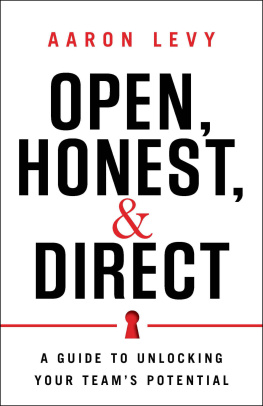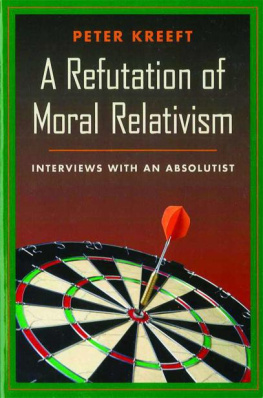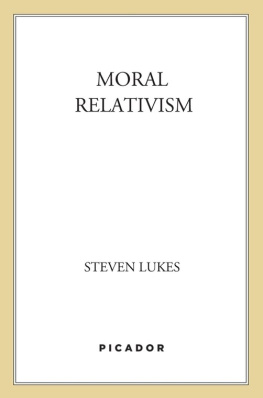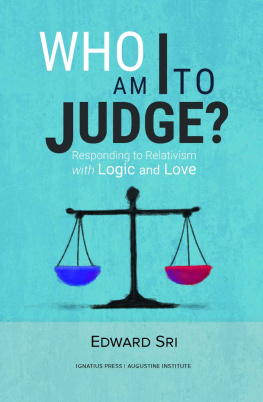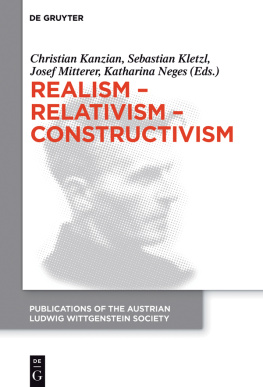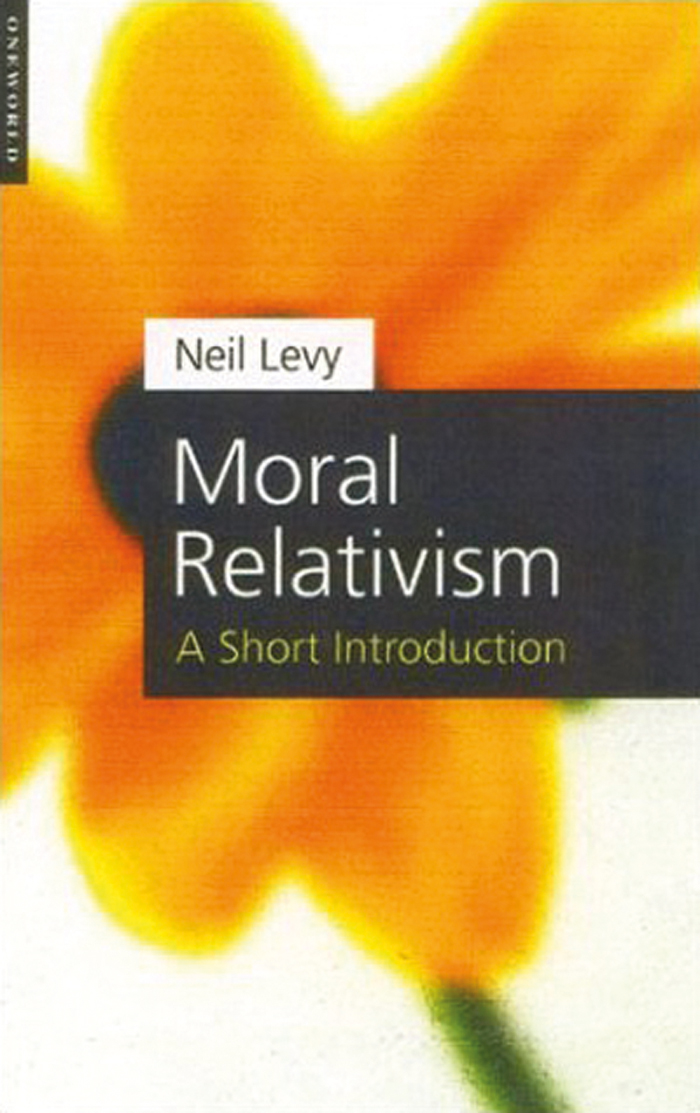Moral
RELATIVISM
A SHORT INTRODUCTION
Moral
RELATIVISM
A SHORT INTRODUCTION
Neil Levy

MORAL RELATIVISM: A SHORT INTRODUCTION
This ebook edition published by Oneworld Publications, 2014
First published by Oneworld Publications, 2002
Oneworld Publications
10 Bloomsbury Street
London WC1B 3SR
England
www.oneworld-publications.com
Neil Levy 2002
All rights reserved
Copyright under Berne Convention
A CIP record for this title is available
from the British Library
ISBN 9781851683055
ISBN 9781780744544(ebook)
Cover illustration by Andrzej Klimowski; cover
design by Perks-Willis Graphic Design.
Stay up to date with the latest books,
special offers, and exclusive content from
Oneworld with our monthly newsletter
Sign up on our website
www.oneworld-publications.com
CONTENTS
On 11 September 2001 an American Airlines jet crashed into the north tower of the World Trade Center in New York. Eighteen minutes later, a United Airlines flight crashed into the south tower. All passengers on both planes were killed, as were the passengers and crew aboard two other flights: an American Airlines flight that crashed into the Pentagon in Washington, and a United Airlines flight that crashed near Pittsburgh. Worse still were the casualties on the ground. As I write, estimates of the number killed in New York still vary, from around three to five thousand. Office workers, waiters in the restaurants, fire-fighters and passengers; all perished in the fire, or in the collapse of the twin towers.
The reaction of most people around the world to these events was shocked horror. Even some of the United States harshest critics were quick to condemn the terrorist actions as barbarous atrocities. This was murder, pure and simple, most people said, and nothing could justify it. Yet, if moral relativism is true, perhaps these events might turn out to be justifiable.
What might a moral relativist say concerning 11 September? She might point out, first of all, that the perpetrators of these acts did not believe themselves to be doing anything wrong. Far from being ashamed of their acts, terrorists are usually proud of what they have done (or plan to do, in the case of those who expect to die as a consequence of their actions). Murderers normally regret their actions, at least somewhat; terrorists exult in them. Now, we can react to this fact in one of two ways. We can say that the terrorists failure to regret their actions makes them morally worse than the average murderer, who, we hope, feels some pangs of conscience. Or we can wonder whether the fact that the terrorist is proud of his or her act shows that it is not wrong at all, at least not wrong for him or her. It is this second course of action that relativism tempts us to take.
Strengthening the claim that the terrorists acts are not wrong for them is the fact that they can and do cite justifications for their actions. Osama bin Laden, who most people believe was behind the attacks on America, claims that the Pentagon and the twin towers were legitimate targets in a war against America. The Pentagon is, of course, a symbol of the American military, while the World Trade Center was a symbol of Americas economic might. The occupants of these buildings therefore could not be considered ordinary civilians, but were engaged in the war the United States is conducting against Islam. After all, the United States is by far the biggest donor to the state of Israel, which continues to oppress the largely Muslim Palestinians, and is responsible for the maintenance of crippling sanctions upon Iraq, sanctions which, according to UNICEF, have been estimated to be responsible for no fewer than half a million deaths. The attacks of 11 September were therefore justified, both by the fact that they limited Americas ability to wage its war against Islam, and by the fact that they undermined US morale, thus weakening its resolve to continue to wage war.
Moreover, bin Laden claims, his war against the United States is justified upon religious grounds. We are carrying on the mission of our Prophet, Muhammad []. This is defensive Jihad [Holy War]. He cites passages of the Quran and Muhammads example in support of the actions of the terrorists, and as part of calling for further such acts. Spreading the word of the prophet, and protecting Islamic nations, not just against aggression, but also against the cultural influence of the West, is sufficient justification for terrorist acts.
Now, the moral relativist will not endorse bin Ladens reasoning. That is, she will not conclude, with bin Laden, that the terrorist actions were morally right, in the sense in which we normally use that word. But she might nevertheless think that they were justified. A radical relativist holds that an action is right for someone if and only if it is justified by the reasons available to that person (or, even more radically, if and only if that person thinks it is right). Thus, she will say that the terrorist acts were right for Osama bin Laden, for the terrorists themselves and for anyone else who shares the same set of justificatory reasons. Thus the relativist comes to a surprising conclusion: those same acts that most of us condemned as murder were (also) morally right. She applies the words of morality, right and wrong, good and bad, and so on, relativistically, asking, with regard to each of them, right or wrong for whom?
Thus, too, the counterintuitive implications of moral relativism do not stop there. For at the very same time as the relativist endorses the reasoning of bin Laden, she also endorses the views of the rest of us, of those who condemn the attacks. We point out that most of the victims of the attacks were innocent civilians, people who had nothing to do with any supposed war upon Islam. Even if there were such a war, which is very doubtful, it would not justify the mass slaughter of such civilians. Some of us dispute bin Ladens interpretation of the Quran; others hold that whatever the Quran says is irrelevant to the question of whether the slaughter of the innocent is justified. Such an act is against all civilized laws, all canons of decency, we maintain. And the relativist endorses what we have to say. The terrorists actions were, she agrees, wrong. But, she adds, they are only wrong for us. Thus their wrongness is relative to us, to our reasons and our judgements, and does nothing to alter the fact that the very same acts remain right for bin Laden and those who see matters from his standpoint
We can already begin to see why moral relativism arouses such strong emotions. It is capable, we see, of generating views that are shocking for instance, of endorsing the view that an act of massmurder is morally right. And as if shocking our moral sensibilities were not enough, it also seems to give rise to paradoxes that are as much an affront to our intellect as its moral views are to our ethics. For instance, it appears to say that one and the same act is both ethically right and ethically wrong, at the very same time. Moreover, the strange and apparently contradictory results of applying relativist views to this case is not an isolated anomaly. Relativism, at least in the hands of its more radical proponents, regularly comes to conclusions just as disorienting. It declares, for instance, that human sacrifice as practised by the Aztecs was right, at least







